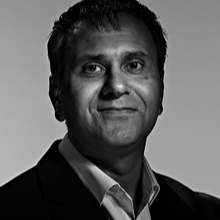Professor Gurdyal Besra wins the 2016 Unilever Colworth Prize
18 March 2016

Today at the Annual Conference, Professor Gurdyal ‘Del’ Besra from the University of Birmingham will be awarded the Society’s Unilever Colworth Prize, sponsored by Unilever Research’s Colworth Laboratory. Professor Besra has been awarded the prize in recognition of his study of Mycobacterium tuberculosis.
When did you first become aware of science?
Probably when I was 17 or 18, when I was doing my A levels. I got very interested in chemistry at the time, particularly in the context of what it did for biology.
This seems directly related to what you do now – can you imagine yourself having gone down a straight chemistry route?
Probably not. Originally my aspiration was to do pharmacy. I never really did that well at school and ended up trickling into the university system. Newcastle University contacted me about studying Chemistry – my interview took place with a guy called Professor David Minnikin, who was studying the cell envelope of Mycobacterium tuberculosis, so was very much interested in the biology of the organism but also from a biochemical viewpoint. David actually ended up being my PhD supervisor and someone that I still work with now, despite having moved about during my career.
You’ve worked in America as part of your early career – do you think working abroad is something that early career researchers should consider?
There’re two views on this. You don’t have to go abroad, but sometimes going to a different laboratory and getting a new perspective, maybe in a different area of biology, is good for an individual. There’s a risk that as a scientist your vision can get quite tunnelled. I think that for these reasons it’s good to move. However, you can also get individuals who could perfectly well make their own way in the same institution, so it really depends on the person and their aspirations.
Your first postdoctoral role was in 1990. How much have we learnt about TB since then?
We practically knew none of the enzymes that TB uses to build its cell wall. Since then, we’ve built up this really complex pathway of what each enzyme does, what its substrate is, its crystal structure, any inhibitors, and so on. We’ve also moved from a flat 2D model of the cell wall to knowing more of a three dimensional representation.
The Unilever Colworth Prize is awarded to someone ‘who has demonstrated outstanding contribution to translational microbiology’. What’s the translational aspect of your work?
One of the big problems in drug discovery is that – when looking in isolation – you can identify fantastic nanomolar inhibitors against an enzyme, but these won’t do anything against a whole bacterium, because they simply can’t get in. We’ve been going back to what people were doing in the ‘50s and ‘60s: taking the whole bacterium and screening it for inhibitors. While this helps to find interesting molecules, it doesn’t tell you what they’re doing. That’s where our work comes in, developing platforms and technology to identify the targets and the inhibitors’ modes of action. At the same time, we’ve been working with GSK to develop new lead molecules for drug discovery.
How will this work help the fight against TB?
I think that the work we’re doing will bear fruit – we’ve got really good inhibitors coming through. One of the problems with drug discovery – and translating compounds into drugs – is the timeframe it takes. You’re usually talking anything from 5–10 years, but I think the work we’ve done over the past two or three is showing real promise.
What will you be talking about in your presentation today?
I’ll be going back to the beginning and talking about the problems with TB and why it has a high incidence and mortality rate. I’ll talk about how the cell wall has historically been a good drug target, and how we’ve built up our knowledge of the pathways involved in its construction. I’ll also talk about how we’ve explored these pathways and turned them into hits for drug discovery.
What’s surprised you in your career?
When I was in the US and looking to come back, I was surprised by how open ‘UK Science PLC’ is – both in terms of the academic community and the funding agencies, who have each been hugely supportive since I’ve returned to Britain.
What does winning this prize mean to you?
People who know me know that I’m very modest and don’t like to play up what I do – I’ve always looked at it as just going to work and not doing anything special compared to what anyone else is. When you receive a prize you feel a great sense of value in having others in the research community recognise what you do in a wider context.
Image: University of Birmingham..
